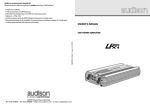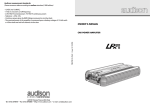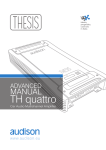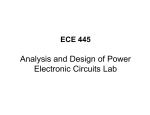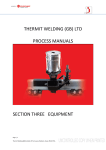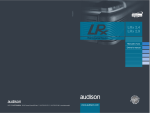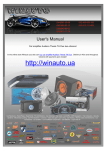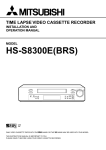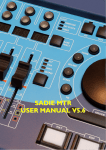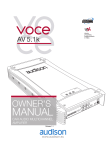Download Audison LRX2 500 Owner`s manual
Transcript
OWNER’S MANUAL CAR POWER AMPLIFIER INTRODUCTION INTRODUCTION Audison thanks you for preferring this product and compliments you on your choice since it was designed in order to insure outstanding musical and instrumental performances. Before use instructions, please carefully read the safety norms you have to respect in order to avoid unpleasant inconveniences and to enjoy this product at best. PRECAUTIONS - Avoid to install the amplifier where temperature is below 0°C or above 55°C and in non ventilated places. - The amplifier needs 12VDC power supply voltage with negative to ground. Be sure that your car electric system is compatible with the amplifier ordinary functioning. - For safer driving, we recommend to adjust volume not to drown external traffic sounds. WARNING!: While installing the amplifier, make sure that the cable coming from the battery positive pole (+) doesn’t touch the amplifier heat sink. The heat sink is directly connected to the battery negative pole (-) through the screws which fix it to the vehicle chassis. Its contact with the positive pole cable would cause short circuit and, thus, possible fires and battery damages. Please connect power supply cables to the amplifier terminal blocks (POWER + and -) before and to battery AFTER, to get maximum safety. CAUTIONS INPUTS: If the source output signal ground (PRE OUT) is not connected to the source chassis and the system sound is not powerful enough or is distorted, try to solve the problem by connecting the output signal cable braided shield (PRE OUT) to a point of the source chassis. OUTPUTS: Don’t connect –L and –R power outputs to each other or to ground (car chassis). In case you use an external crossover, make sure that channels grounds are not connected one to the other. 2 CONTENTS Description . . . . . . . . . . . . . . . . . . . . . . . . . . . . . . . . . . . . . . . . . . . . . . . . . . . . . . . . . . . . . . . . . . . . . . . . . . . . . . . . . . . . . . p. 4 In-Out panel Functions . . . . . . . . . . . . . . . . . . . . . . . . . . . . . . . . . . . . . . . . . . . . . . . . . . . . . . . . . . . . . . . . . . . . . . . . . . . . . . . . . . . . . . . . . . . . 5 Power supply panel Functions . . . . . . . . . . . . . . . . . . . . . . . . . . . . . . . . . . . . . . . . . . . . . . . . . . . . . . . . . . . . . . . . . . . . . . . . . . . . . . . . . . . . . . . . . . . . 6 Fuse replacement . . . . . . . . . . . . . . . . . . . . . . . . . . . . . . . . . . . . . . . . . . . . . . . . . . . . . . . . . . . . . . . . . . . . . . . . . . . . . . . . . . . . 7 Controls panel Functions and controls . . . . . . . . . . . . . . . . . . . . . . . . . . . . . . . . . . . . . . . . . . . . . . . . . . . . . . . . . . . . . . . . . . . . . . . . . . . . . . . 8 Setting panel Functions . . . . . . . . . . . . . . . . . . . . . . . . . . . . . . . . . . . . . . . . . . . . . . . . . . . . . . . . . . . . . . . . . . . . . . . . . . . . . . . . . . . . . . . . . . . . 10 Subsonic filter cut-off frequency modification . . . . . . . . . . . . . . . . . . . . . . . . . . . . . . . . . . . . . . . . . . . . . . . . . . . . . . . . . 11 VCA-VCA1D modules insertion . . . . . . . . . . . . . . . . . . . . . . . . . . . . . . . . . . . . . . . . . . . . . . . . . . . . . . . . . . . . . . . . . . . . . . . . 11 Technical features Size for fixing . . . . . . . . . . . . . . . . . . . . . . . . . . . . . . . . . . . . . . . . . . . . . . . . . . . . . . . . . . . . . . . . . . . . . . . . . . . . . . . . . . . . . . . . 12 LRx 1.400 . . . . . . . . . . . . . . . . . . . . . . . . . . . . . . . . . . . . . . . . . . . . . . . . . . . . . . . . . . . . . . . . . . . . . . . . . . . . . . . . . . . . . . . . . . . . 12 Accessories VCR01K, VCRAK and VCRDK . . . . . . . . . . . . . . . . . . . . . . . . . . . . . . . . . . . . . . . . . . . . . . . . . . . . . . . . . . . . . . . . . . . . . . . . . . 13 CLK2 - LRx Cooling Kit . . . . . . . . . . . . . . . . . . . . . . . . . . . . . . . . . . . . . . . . . . . . . . . . . . . . . . . . . . . . . . . . . . . . . . . . . . . . . . . . 14 Configurations Block diagram . . . . . . . . . . . . . . . . . . . . . . . . . . . . . . . . . . . . . . . . . . . . . . . . . . . . . . . . . . . . . . . . . . . . . . . . . . . . . . . . . . . . . . . 16 Configurations table . . . . . . . . . . . . . . . . . . . . . . . . . . . . . . . . . . . . . . . . . . . . . . . . . . . . . . . . . . . . . . . . . . . . . . . . . . . . . . . . . 17 Controls panel diagram . . . . . . . . . . . . . . . . . . . . . . . . . . . . . . . . . . . . . . . . . . . . . . . . . . . . . . . . . . . . . . . . . . . . . . . . . . . . . . 17 Configuration examples Front+Subwoofer . . . . . . . . . . . . . . . . . . . . . . . . . . . . . . . . . . . . . . . . . . . . . . . . . . . . . . . . . . . . . . . . . . . . . . . . . . . . . . . . . . . . Front (Dual Mono) +Subwoofer . . . . . . . . . . . . . . . . . . . . . . . . . . . . . . . . . . . . . . . . . . . . . . . . . . . . . . . . . . . . . . . . . . . . . . . Front (Dual Mono) . . . . . . . . . . . . . . . . . . . . . . . . . . . . . . . . . . . . . . . . . . . . . . . . . . . . . . . . . . . . . . . . . . . . . . . . . . . . . . . . . . . Front+Rear+Subwoofer . . . . . . . . . . . . . . . . . . . . . . . . . . . . . . . . . . . . . . . . . . . . . . . . . . . . . . . . . . . . . . . . . . . . . . . . . . . . . . Multichannel . . . . . . . . . . . . . . . . . . . . . . . . . . . . . . . . . . . . . . . . . . . . . . . . . . . . . . . . . . . . . . . . . . . . . . . . . . . . . . . . . . . . . . . . 18 18 19 19 20 Installation Logo rotation . . . . . . . . . . . . . . . . . . . . . . . . . . . . . . . . . . . . . . . . . . . . . . . . . . . . . . . . . . . . . . . . . . . . . . . . . . . . . . . . . . . . . . . . Amplifier fixing . . . . . . . . . . . . . . . . . . . . . . . . . . . . . . . . . . . . . . . . . . . . . . . . . . . . . . . . . . . . . . . . . . . . . . . . . . . . . . . . . . . . . . Electric connections . . . . . . . . . . . . . . . . . . . . . . . . . . . . . . . . . . . . . . . . . . . . . . . . . . . . . . . . . . . . . . . . . . . . . . . . . . . . . . . . . . audison cable products for electric connections . . . . . . . . . . . . . . . . . . . . . . . . . . . . . . . . . . . . . . . . . . . . . . . . . . . . . . 21 22 22 23 audison measurement standards . . . . . . . . . . . . . . . . . . . . . . . . . . . . . . . . . . . . . . . . . . . . . . . . . . . . . . . . . . . . . . . . . 24 3 DESCRIPTION Audison LRx 1.400: Mono car power amplifier characterised by excellent musical performances, small size and outstanding energy reserve. Its PWM power supply stage is stabilised and oversize. Thanks to its great capacity to supply current and to the use of three 70A Mosfets pairs, this amplifier can easily drive even the hardest loads. Input stage is provided with a special circuit (LNS) which permits the system disturbances rejection, reducing noise that is usually due to the vehicle electric parts (alternator, electronic injection, etc.), without altering musical signal quality. Amplifier stage is made with six pairs of 18A MOSFETs and A Class bipolar driver. This allows LRx 1.400 to satisfy any power needs, supplying 350W with 4 Ohm load, 650W at 2 Ohms and 900W at 1 Ohm in continuous mode. Differently from what occurs with other amplifiers, LRx 1.400 is not blocked by protection systems immediately below these load values. Its exclusive “Overload Limiter” circuit allows it to go on working, limiting output power and pointing out how hard the applied load is by the “Limit” LED blinking. Its big power reserve, its constant control at low frequencies and its exquisite timbre qualities make it an ideal amplifier to drive subwoofer and Full Range systems and to realise configurations designed to attain very high sound pressures (SPL). LRx 1.400 has a bypass subsonic filter (24dB/Oct.) with adjustable frequency, pre-set at 20Hz. It also has two bypass Butterworth crossovers with independent frequencies. LO-PASS filter has 24dB/Oct. slope; it’s possible to adjust its Q factor. HI-PASS filter has a 12dB/Oct. slope; it handles the high frequencies signal to send to the preamplified output (PRE OUT).There is a phase inverter (0°÷180°) which is useful to recover the acoustic delay between subwoofer and front sections. In case LRx amplifiers are used in extremely difficult conditions (very low loads) or in installations where space is too narrow and their heat sink cooling is not enough, they can be employed together with CLK2 cooling system (optional). It is a system made of two units to apply onto the amplifier sides; each of them is provided with an electronically controlled fan that allows the amplifier thermal stabilisation (see “CLK2 – LRx Cooling Kit”). Protection includes: • RGP (Resettable Ground Protection) circuit; in case a short circuit occurs between loudspeakers outputs and car chassis, it detects a high current flow in the pre-input ground and acts by putting the amplifier in stand-by, protecting its circuitry; • a device against short circuits and against DC in the outputs, to protect loudspeakers; • a device that detects the amplifier temperature excessive increase and stops its functioning until optimal conditions occur again. Once the causes which implied protection circuits intervention have been checked and solved, the amplifier is reset by switching it off and on again. The amplifier is also provided with another general protection which is insured by an internal strip fuse, very easy to reach. Optional: The following devices are available upon request: 1 - Three kits for subwoofer volume remote control: • VCR01 and VCRAK (analogue and specific for subwoofer); • VCRDK (digital; it can be used for master volume control or for level control of any ways in a multichannel system). 2 - CLK2 cooling system. 4 IN-OUT PANEL FUNCTIONS 1 SPEAKER A/B (LO-BYPASS) Amplifier power outputs. Signal is MONO. The two outputs are in parallel in order to allow the connection of one, two or more speakers. Connect the speakers cables to these outputs according to polarity. Terminal blocks accept cables up to 9 A.W.G. max (see “audison cable products for electric connections” as far as their size is concerned). We recommend the use of audison cable products. 2 PPS (Phantom Power Supply) Power supply socket for audison external audio accessories. 2 3 1 L 1 R 3 4 IN Amplifier left (L) and right (R) channels inputs. The preamplified outputs (PRE OUT) of a source (head unit, CD player, DAT, etc.) or of an external electronic crossover must be connected to them. If you bypass the LO-PASS filter (F1: ), only the right channel (R) signal will be amplified; if you apply preamplified signals to inputs, you’ll always have them on the corresponding outputs (OUT). 4 OUT/HI-BYPASS Amplifier left (L) and right (R) channels preamplified outputs. Available signal is Hi-PASS or full range (see “Configurations table”). 5 POWER SUPPLY PANEL FUNCTIONS 1 REMOTE IN Terminal to connect Remote cable, which comes from the source and which controls the amplifier switching on. Applied voltage must be between 7 and 15VDC. 2 POWER IN OUT REMOTE 1 3 FUSE 2 4 5 REMOTE OUT Terminal to repeat the switching on control (Remote IN) coming from the source. It is used to switch on another amplifier or device in the system simultaneously. Available voltage is the same as the one applied on Remote IN. 3 VCR (optional kit) Terminals to connect VCR01/VCRA/VCRD adjuster included in VCR01K/VCRAK/VCRDK volume remote control kits. 4 FUSE (60A) Strip fuse. It insures the amplifier general protection. In case the fuse breaks down, please replace it by respecting its original value. CAUTION: If you want to protect the system even more, please put a strip fuse onto the cable which connects the battery positive pole to the amplifier POWER (+) terminal block (see “Electric connections”). 5 POWER Terminal blocks for the amplifier power supply cable connection. Connect positive and negative poles according to indicated polarities. Holes have 8mm diameter and accept cables up to 3 A.W.G. max. In order to get the best current transfer, please use power supply cables with as big a section as possible. audison cable catalogue offers you a complete range of such products which can satisfy whatever demands; you can also find Maincrimp terminals in it. We strongly recommend their use because they contain the cable non protected end and allow the terminal block to fasten all its useful section. 6 POWER SUPPLY PANEL FUSE REPLACEMENT 1 - Open the transparent cover by pushing the two teeth in its lowest corners to the direction indicated by the arrows. 2 - Remove the screws which fasten the fuse to eliminate pieces of the broken one; prevent them from going into the device. 3 - Check the value of the new fuse to assemble, then fix it by gradually and alternately fastening the two screws. This will avoid voltage drops along the line and will make the device perfect functioning easier. 4 - Close the transparent cover. 7 CONTROLS PANEL FUNCTIONS AND CONTROLS 1 LIMIT (orange LED) It indicates the Overload Limiter circuit is on. Caution: When this led is on (although sporadically), it means the applied load is a hard one.The activation of Overload Limiter circuit (output power limiter) will anyway allow the amplifier to function without distortions. In case Overload Limiter gets on too frequently (at every power peak), you will need to check if there are any failures or a too hard load (that’s to say impedance is about 50% lower than the minimum recommended one). The amplifier can go on functioning in these conditions but power will inevitably decrease. 1 2 2 ON (green LED) It indicates the amplifier is on. 11 3 10 4 9 5 8 6 7 3 HI-PASS It permits to choose whether to send a full range signal (BYPASS) or a 12dB/Oct. HI-PASS signal for high frequencies (ON) to the preamplified output (PRE OUT). 8 CONTROLS PANEL 4 8 LO-PASS It permits to choose whether to send a full range signal (BYPASS) or a 24dB/Oct. LO-PASS signal for low frequencies (ON) to the amplifier stage. F1 Q It permits to adjust the LO-PASS filter Q, varying the filter gain at its cut-off frequency. It is useful to linearise the system response in the HI-PASS and LO-PASS crossover point. 5 SUBSONIC It permits to eliminate subsonic frequencies; these sounds cannot be heard by human ears but cause useless and damaging stress to amplifier and speakers. Subsonic filter can be bypassed (BYPASS) and it is pre-set at 20 Hz. Its cut-off frequency can be adjusted between 16 and 32 Hz through 4 Hz steps; this occurs by replacing the special resistors located into a socket which can be reached through the setting panel in the amplifier bottom (see “Subsonic filter cut-off frequency modification”). 9 F1 It permits to adjust LO-PASS filter cut-off frequency between 40 Hz and 500 Hz. 10 F2 It permits to adjust HI-PASS filter cut-off frequency between 40 Hz and 500 Hz. 6 11 LEVEL It permits to adjust the amplifier input sensitivity and sets its output level. SAFETY (red LED) It indicates that the amplifier protection circuits are on. In order for the amplifier to work again, you need to switch the system off and then on after 10 seconds at least. We recommend to check all connections before switching the amplifier on again. If LED stays on, please contact Audison authorised after sale centres. 7 PHASE (0 /180 ) It permits to invert the phase of the signal on the speakers output terminal blocks. It is especially useful to acoustically align subwoofer and front system. 9 SETTING PANEL FUNCTIONS It permits to reach the resistors to set subsonic filter cut-off frequency and to insert VCA modules for the subwoofer volume remote control. Setting panel 1 - Remove the setting panel in the amplifier bottom in order to carry out operations. 2 - Once operations have been carried out, please close the setting panel. 10 SETTING PANEL SUBSONIC FILTER CUT-OFF FREQUENCY MODIFICATION Subsonic filter is pre-adjusted at 20 Hz. In order to modify this value, please act according to what follows. Procedure: FS2 FS3 FS1 FS4 15K 100K 39K 33K VCA 5 mm Replace FS1, FS2, FS3, FS4 resistors according to the values in the setting panel table. 10 mm Remark: Cut the new resistors rheophores according to the size in the picture. VCA-VCA1D MODULES INSERTION LRx 1.400 can accept one of the three optional kits which allow the subwoofer volume remote control: VCR01K, VCRAK or VCRDK. These kits have a specific module, VCA or VCA1D, to insert into the amplifier through the setting panel. REMARK: please use VCRDK kit when the amplifier LO-PASS filter is off (F1: Installation: 1 - Remove BYP12 bridge. 2 - Insert VCA/VCA1D module. - Insertion key. It prevents the module from being inserted in the wrong way. 11 ). TECHNICAL FEATURES SIZE FOR FIXING * Drilling dimensions for fixing LRx 1.400 POWER SUPPLY Voltage: . . . . . . . . . . . . . . . . . . . . . . . . . . 11 ÷ 15 VDC Idling current:. . . . . . . . . . . . . . . . . . . . . . . . . . . . 1.9 A Idling current when off: . . . . . . . . . . . . . . . 0.02 mA Output power (RMS) @ 13.8 VDC; THD 1% - A config.: . . . . . . . . . . . . . . . . . . . 350W x 1 (4 Ohm) - B config.: . . . . . . . . . . . . . . . . . . . 650W x 1 (2 Ohm) - C config.: . . . . . . . . . . . . . . . . . . . 900W x 1 (1 Ohm) Consumption @ 13.8 VDC (Max Musical Power): - A config. (see Output Power): . . . . . . . . . . . . . 20 A - B config. (see Output Power): . . . . . . . . . . 37.5 A - C config. (see Output Power): . . . . . . . . . . . . 55 A FILTERS/INPUTS Sub: . . . . . Bypass/ 24dB/Oct. Lo-Pass (40 ÷ 500 Hz) Phase: . . . . . . . . . . . . . . . . . . . . . . . . . . . . . . . 0° ÷ 180° Q control (LO-PASS): . . . . . . . . . . . . . . . . . . . . 0.7 ÷ 2 Subsonic: . . . . . Bypass/ 24dB/Oct. Hi-Pass, 16÷32 Hz . . . . . . . . . . . . . . . . . . . . . . . . . . . . . . . . (pre-set at 20 Hz) Pre Out: . Bypass/ 12dB/Oct. Hi-Pass (40 ÷ 500 Hz) AMPLIFIER STAGE Distortion – THD (1kHz): . . . . . . . . . . . . . . . . 0.06 % Bandwidth (-3dB): . . . . . . . . . . . . . . . . 4 Hz ÷ 60 kHz S/N ratio(A weighed @ 1V):. . . . . . . . . . . . . . 105 dB Damping factor (1 kHz, 4 Ohms): . . . . . . . . . . . 200 Input sensitivity: . . . . . . . . . . . . . . . . . 0.2 ÷ 5 VRMS Input impedance:. . . . . . . . . . . . . . . . . . . . 15 kOhms Inputs: . . . . . . . . . . . . . . . . . . . . . . . . . . . . . . . . . IN L-R OTHER FUNCTIONS Remote IN: . . . . . . . . . . . . . . . . . . 7 ÷ 15 VDC – 1 mA Remote OUT: . . . . . . . . . . . . . . . . . . 12 VDC – 10 mA Auxiliary power supply (PPS): . ±12 VDC – 300 mA IN VCR (SUB volume) VCA/VCA1D attenuation:. . . . . . . . . . . . . . . . 100 dB Fuse:. . . . . . . . . . . . . . . . . . . . . . . . . . . . . . . . . . . . . 60 A Load impedance: - 1 Ch. mono: . . . . . . . . . . . . . . . . . . . . 4 - 2 - 1 Ohms MAX SIZE (L x H x D): . . . . . . . . 176 x 56 x 370 mm Nominal output power (RMS) NP @ 12VDC; THD 0.3%: . . . . . 300W x 1 (4 Ohms) WEIGHT: . . . . . . . . . . . . . . . . . . . . . . . . . . . . . . 3.6 kg 12 ACCESSORIES VCR01K,VCRAK and VCRDK LRx 1.400 can accept one of the optional kits that allow the subwoofer volume remote control. VCR01K and VCRAK are analogue and special for sub; VCRDK is digital and can be used for master volume control or for level control of any ways in a multichannel system. These kits are available as accessories and consist of three elements: 1) Volume adjuster (VCR01/VCRA/VCRD); 2) VCA/VCA1D module to put inside the amplifiers; 3) Wire to connect VCR01/VCRA/VCRD adjusters to the proper sockets in the amplifier rear panel and to the car lights switch, in order to light it up. Install VCR01/VCRA/VCRD adjusters in a place you can easily and comfortably reach, according to the following connection diagram. POWER IN OUT REMOTE FUSE Remote Out Yellow/White Yellow/White Blue VCR 01 0 Control min max VCR01 VCRD/VCRA Black Black Red FUSE (250mA) Ground Red FUSE (250mA) Orange Lights switch Ground - + Battery 13 ACCESSORIES CLK2 - LRx Cooling Kit This cooling system is specially designed to provide LRx amplifiers with the right working temperature. CLK2 should be used when LRx amplifiers work in extremely hard conditions (very low loads) or in installations where space is too narrow and heat sink cooling is not enough. It consists of two units to apply onto the amplifier sides; each of them is provided with an electronically controlled fan. Its intervention depends on a thermal sensor that starts the system as soon as LRx heat sink reaches 45°C. The same sensor is connected to a special circuit which controls the two fans speed progressive increase when temperature increases, too. Air flux constant control allows the amplifier very good thermal stabilization and limits noise. 14 ACCESSORIES Installation: Remote First fan Second fan Remote IN Remote OUT + POWER + 12 V 15 R L L N S R OUT HI/BYPASS L IN 16 NON INDEPENDENT FREQUENCY CONTROL mute HI-PASS MIX + R INDEPENDENT FREQUENCY CONTROL Hz 12dB / stereo F2 R Channel only L Hz 24dB / mono F1 HI-PASS F1 LO-PASS Adj. Q PHASE VCA Hz V LEVEL SUBSONIC NON INVERTED AMPLIFIER 24dB / mono SUBSONIC BYPASS module BYP12 BAND-PASS LO-PASS INVERTED AMPLIFIER Amp STEREO SIGNAL SPEAKER B LO/BYPASS SPEAKER A LO/BYPASS CONFIGURATIONS BLOCK DIAGRAM CONFIGURATIONS CONFIGURATIONS TABLE LRx 1.400 can be configured as follows: Config. 1 = Speaker A/B (Full Range); Pre Out (Full Range) Config. 2 = Speaker A/B (Full Range); Pre Out (Hi 12 dB) Config. 3 = Speaker A/B (Lo 24 dB); Pre Out (Full Range) Config. 4 = Speaker A/B (Lo 24 dB); Pre Out (Hi 12 dB) CONTROLS PANEL DIAGRAM 17 CONFIGURATION EXAMPLES FRONT+SUBWOOFER FRONT (DUAL MONO)+SUBWOOFER 18 CONFIGURATION EXAMPLES FRONT (DUAL MONO) Pre Out Right Left LRx 1.400 Config. 1/2 LRx 1.400 Config. 1/2 + Woofer + Midrange Tweeter Woofer Left Midrange Tweeter Right FRONT + REAR + SUBWOOFER Pre Out Rear + + Tweeter Tweeter Woofer + Woofer Rear + + Tweeter Tweeter Woofer LRx2 + Front Woofer Front Config. 1/2/3/4/6 19 LRx2 Config. 2/4/6 Subwoofer Subwoofer LRx 1.400 Config. 4 CONFIGURATION EXAMPLES MULTICHANNEL Pre Out Left Right LRx1.400 Config. 4 LRx1.400 Config. 4 + + Subwoofer + + Subwoofer Subwoofer LRx1.400 Config. 4 Subwoofer LRx1.400 Config. 4 + + + + Woofer Woofer Woofer Woofer LRx2 LRx2 Config. 2/4/6 Config. 2/4/6 mono: Mode mono: Mode + + Midrange Tweeter Midrange 20 Tweeter INSTALLATION LOGO ROTATION 1 - Remove the transparent cover which protects controls and then the 4 screws which block the metal plate by using multispanner. 2 - Remove the plate without damaging the silkscreen printed panel which will have to stay on. We suggest that you seize both plate grips with your hands and pull them by blocking the silkscreen printed panel with your fingers against the amplifier chassis at the same time.This will permit to remove the plate from the panel without damages. POWER IN OU T REMOTE FUSE 3 - Remove the strip with audison logo. 4 - Put the strip back again after turning it, so that audison logo is upside down. 5 - Mount the plate back by fixing it through the screws; then, re-assemble the transparent cover which protects controls. 21 INSTALLATION AMPLIFIER FIXING ELECTRIC CONNECTIONS CAUTION! For the system safer protection, we recommend the use of a strip fuse on the cable that connects the battery positive pole to the amplifier POWER (+) terminal block. This fuse has to be installed about 10 cm far from the battery; its value will have to be equal or slightly higher (+10% approx.) than consumption @13.8 VDC, according to the different configurations (see “Technical features”). It will have to be equal to the sum of the values of all fuses in case system consists of several amplifiers or in case amplifiers have several fuses. LRx 1.400 FUSE: 60A 22 INSTALLATION audison cable PRODUCTS FOR ELECTRIC CONNECTIONS 23 Audison measurement standards (Power measures taken according to audison standard, 1998 edition) PRINTED IN ITALY - Code 10125750 - 12VDC and 13.8VDC; - 1 kHz or crossover cut-off frequency; - 0.3% THD @ nominal power; 1% THD @ continuous power; - Tolerance: +10%; -5%; - Continous power given by RMS Voltage measured on resistive load; - The nominal power of the amplifier is measured upon a battery voltage of 12 Volts with a 4 Ohm load and with all channels in function. is a division of 62018 Potenza Picena (MC) Italy Tel. 0733.870870 • Fax 0733.870880 • http://www.audison.com • e-mail: [email protected]
























